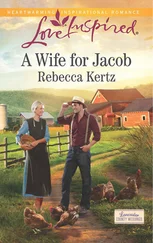Stanley put his carrot down and turned. His face was soft and astonished, blue eyes open wider than Hewlett had ever seen them. He looked like a man who’d just survived an auto crash, a man who’d taken part in something bizarre and terrifying, not just witnessed it from above. “It’s not true, is it?” Stanley spoke slowly, working something out. “What I said before, about Nineveh. We’re — we’re all where we’re supposed to be. I was supposed to wind up here.” He braced himself on the counter, as if he expected God to blow him across town next. “A beast brought Jonah to Nineveh, and a beast brought me here.”
Hewlett said what he’d said so many times before. “The thing is to be listening when God speaks.”

By the time Reverend Hewlett walked home that night by way of the old pool, Davis Thoms and Bernie Lake were down there mixing batch after batch of cement and pouring it into the hole. For the first time in more than a year, there was both enough water to mix the stuff, and not so much water falling from the sky that it would turn to soup.
He continued toward the parsonage. The wind was done. It had simply left town.
It was so strange to be outside without the roar of wind or rain, without the feel of air or water ripping at his skin, that Reverend Hewlett stood awhile on his own porch feeling that he was floating in the midst of vast and empty space. Everywhere he turned, there was nothing. No baking sun, no drenching storm, no raging wind. There were people coming out of houses, and people going into houses, and people walking from one store to the next. And people picking up branches, and people sweeping up glass. As if they’d been directed to do these things.

All this happened a very long time ago. And it’s hard now to argue that what happened so far back wasn’t inevitable. If the elephant hadn’t died, there wouldn’t be, on top of the old swimming pool, the playground that originally had some other name but quickly became known as Elephant Park; and the Little Fork High School football team would not be the Mammoths; and Stanley Tack wouldn’t have stayed in town, and the son he had with the Beedleman girl (she was expecting already that day of the windstorm, she just hadn’t told him yet) wouldn’t have married Eloise Miller, and today the town of Little Fork wouldn’t be half-full of Tacks of various generations, all descended (though they none of them know it) from a fire eater.
Jack Hewlett might not have given up the cloth and returned home to be with his girl, with Annette, who’d waited for him even after her letters stopped — only to be drafted two months later, no longer clergy, no longer exempt from war. He might not have died in France, a bullet through his lung. But who’s to say that the outcome of that battle — even of the entire war — hadn’t hinged, in one way or another, on the bravery of one man? He was, after all, an exceptional soldier. He took orders well.
Or at least it can be said: This world is the one made by the death of that elephant.

The Sunday following the storm, Reverend Hewlett looked out from the pulpit at his battered congregation. There were black eyes and broken arms from the wind, and the women with husbands stationed overseas were exhausted from cleaning up their own yards and their elderly neighbors’ besides. It was a good town that way. These people believed in things. Eloise Miller, unhurt and pink, slept in her mother’s arms through the service. A green bonnet framed her face.
Hewlett, under his robe, was thin. He’d lost five pounds that week. His stomach felt empty even when it was full, so why bother to fill it?
Stanley Tack held hands with the Beedleman girl. For the first time, he joined the hymns. He opened the book of prayer.
Stella Blunt looked pale and tired. Hewlett tried to catch her eye. He felt he owed her at least a look, one she’d be able to interpret later, tomorrow morning, or whenever it was that the citizens of Little Fork would find the parsonage deserted.
If he owed anything to Stanley Tack, he’d already given it. Hadn’t he handed the man his own faith? It was in safer hands now than his own.
He said, “Let us read from Paul’s letter to the Romans: Whom he did predestinate, them he also called: and whom he called, them he also justified: and whom he justified, them he also glorified. ”
He said, “Let us lift up our hearts.”
OTHER BRANDS OF POISON (FIRST LEGEND)
W hether or not there were, at that moment, Jews hiding in the house at the lake, no one can now remember. The point is that there had been, and there would be again; and even if there was not now a human ballast holding that house to the shore, surely there were other things as incriminating. Likewise, it is unclear from this far in the future if the soldiers were even German, or if they were the Russian liberators who so soon became the Russian occupiers. That summer, in that part of Hungary, both were equally likely.
The soldiers pounded at the door looking for whatever it is nineteen-year-old boys in uniform are always looking for: food, lodging, sex, warmth, inebriation, water. In other words: the closest subconscious approximation of their mothers.
They found at this particular house an eight-year-old boy, and a woman too formidable to rape. They found kohlrabi soup and ate it, and they found the boy’s swing set, a four-legged frame standing right in the water, with a swing to jump from and a slide that ended beneath the surface. They left their clothes on the shore and swung from the top bar and broke the whole thing. If no one has exhumed its bones, it is still at the bottom of Lake Balaton. When night fell and there was insufficient firewood, they tore books apart and threw those on the fire. They demanded socks. The woman said, “Would you prefer a lady’s size or a small boy’s?”
That boy stood half-inside a kitchen cabinet, his fingers curled around the handle, his heel kicking the canned fruit he hoped they wouldn’t take. If the story is hazy, seventy years later, that is because it is his. If the details are strangely specific — the dialogue, the type of soup — that is because they are mine.
By the time their flasks ran out, the soldiers were drunk enough to insist on more alcohol, but the woman told them she herself was out and her son did not drink. They began a Russian drinking song, or perhaps a German one, depending on your version of the story.
One undisputed fact: They saw on the kitchen table the large bottle of black ink that had been the boy’s birthday present — a rare gift, dearly bought — and the drunkest soldier announced he had found the alcohol.
The woman told the truth. “That is ink,” she said, “you idiots.” But the soldier opened the top, got an astringent whiff, and declared her a liar and a slut. With his friends pounding the table, he guzzled the entire bottle, and then — friends laughing, pointing, demanding a camera — sputtered black and coughed black and wiped black ink down his arms.
The woman said, “I am a writer. I have plenty more such drinks for you upstairs. Perhaps you’d like a typewriter ribbon.”
The soldier cursed her with black teeth and tongue and lips, his face an abyss. He was already ashen as he stumbled to the door.
My grandmother claimed for the rest of her life that she once killed a soldier with a bottle of ink. Is it possible he did more than empty his stomach in the bushes? I could ask a doctor the effects of eight ounces of cheap ink on top of alcohol and months of hard living.
Читать дальше













